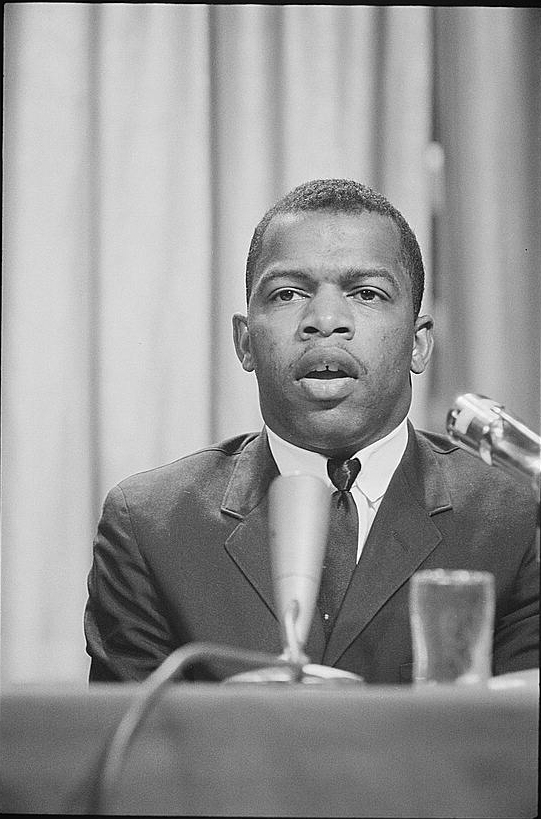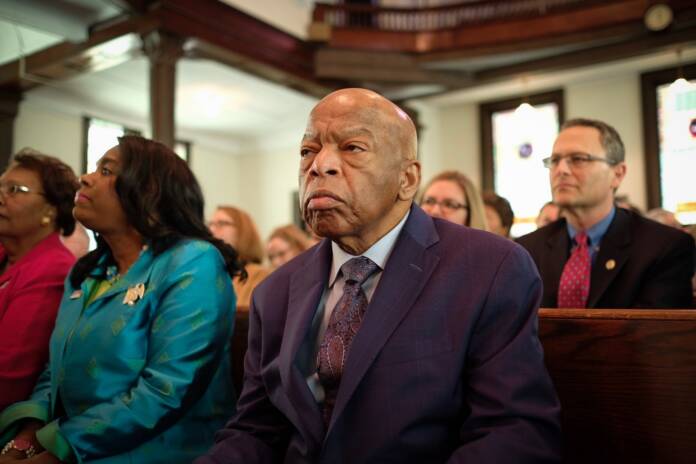Congressman John Lewis, the civil rights icon who has represented the 5th District of Georgia, including Atlanta, since 1987, is 80 now, running for re-election this fall and battling pancreatic cancer. Despite a punishing schedule and illness, he made time on a recent Sunday to visit the Black Lives Matter mural on 16th Street NW outside the White House.
Over the course of his life, Lewis fought segregation and suffered serious injury as one of the Freedom Riders; was a founding member and chairman of the Student Nonviolent Coordinating Committee; is the last living keynote speaker from the historic 1963 March on Washington; had his skull fractured after leading marchers over the Edmund Pettus Bridge in Selma, AL, during 1964’s Freedom Summer; and endured over 40 arrests for his political activities. Looking over that mural commissioned by Washington, DC, Mayor Muriel E. Bowser in the wake of protests against police brutality following the death of George Floyd at the hands of Minneapolis police, must have reminded Lewis of his lifetime’s work fighting for equal rights in America.
There is another, potent reminder of Lewis’s labors in Bay Area filmmaker Dawn Porter’s new documentary, John Lewis: Good Trouble, a film that both takes a measure of the man’s storied political career but also offers a warm, personal portrait of Lewis from his childhood as the son of an Alabama sharecropper to his rise to the halls of Congress. Archival footage and observations of Lewis as he goes about his life blend with interviews with contemporaries like his good friend, the late Maryland Rep. Elijah Cummings, South Carolina Rep. Jim Clyburn, and Bill and Hillary Clinton, and with younger people like New York Rep. Alexandria Ocasio Cortez, New Jersey Senator Cory Booker, and Georgia pol Stacey Abrams.
“Everybody wanted to explain John Lewis’s importance to them,” says Porter. “It was surreal for me. I never thought I’d get to meet Senator Clinton like that.”
Porter, a Film Independent Spirit Award nominee for her 2013 directorial debut Gideon’s Army, a documentary focusing on public defenders, and a Sundance Film Festival special jury prize winner for her 2016 abortion rights documentary Trapped, met Lewis when she interviewed him for her 2018 Netflix series Bobby Kennedy for President. In it, he described volunteering for Kennedy’s campaign, breaking down as he recollected the candidate’s assassination. Lewis’s participation made a powerful impact on that series and on Porter, who found a man with a compelling story that she wanted to tell.
“We had a reception we filmed with Mr. Lewis on the three-day pilgrimage that he makes to Selma, Alabama, and [civil rights attorney] Bryan Stevenson spoke one evening and he said something that really stayed with me, ‘John Lewis had to imagine a life for himself that he did not see,'” Porter recalls.
“When he was growing up, there was no model of racial tolerance and acceptance and equality. He had to imagine that for himself. Somehow he managed to do that even while living in the very segregated South, where it was dangerous to assert your rights. This was not a kid who came from the North and was surprised by the deeply seated racism of the Deep South. He kind of decided that that’s the way the world should be and he would always be pointing towards that goal.”

In the documentary, Lewis’s son John-Miles grouses good naturedly about how long it takes to get through an airport with his father. People constantly stop him to express what he has meant to them; a phenomenon Porter captures on film as he graciously chats or poses for pictures.
“I came to understand why those interactions are so important to Mr. Lewis, because he doesn’t take for granted other people’s gratitude,” Porter says. “He understands that those interactions are really for the other person. He gives kind of solace; he gives peace to people. He knows that is important.
“He’s almost a little surprised when people thank him. ‘I was helping out, I was just helping out.’ I think that is very genuine. I do know that he appreciates when people know who he is and something of what he’s done.”
John Lewis: Good Trouble was timed to come out during the run up to the 2020 presidential election when the voting rights that Rep. Lewis fought so long and hard for are once again in the news. What Porter could not have anticipated are the protests against police brutality and racism roiling across the country. What she hopes is that the film and its portrayal of Lewis’s life and work will serve as an inspiration.
“I know that people give the Congressman so much credit, as they should, for being brave, but I also want them to focus on how strategic he and other leaders of the civil rights movement were,” Porter says. “They didn’t just appear at those marches and protests. Those were planned.
“I think what we’re seeing right now in 2020 is a response. It’s a big, beautiful and necessary response to something shocking, but I think what we saw in the 1960s, at least in some of the protests that Congressman Lewis led, was a plan. Those marches were part of a strategic plan to get us to a different place. I think our response in 2020 can evolve into plans for our future and I hope that people will look to the Congressman’s history to kind of light the way.”
You can watch John Lewis: Good Troublevia the sites listed here.







